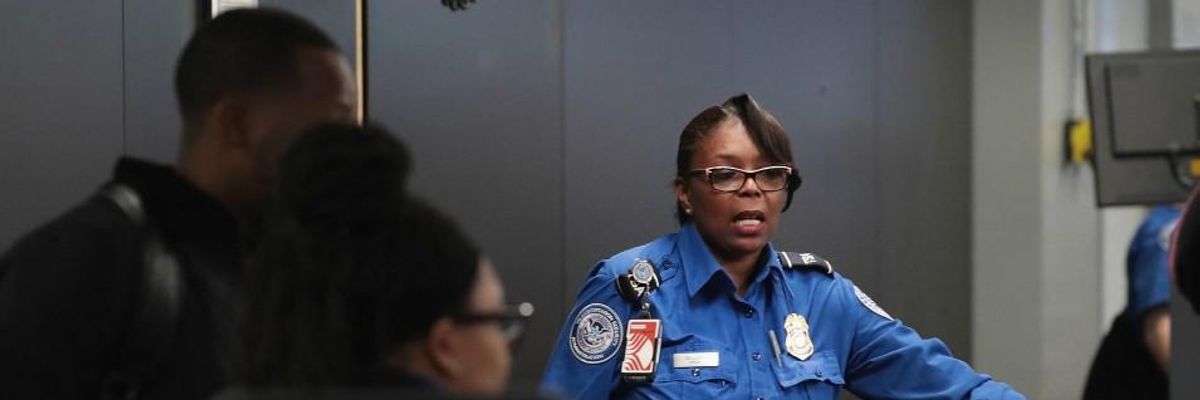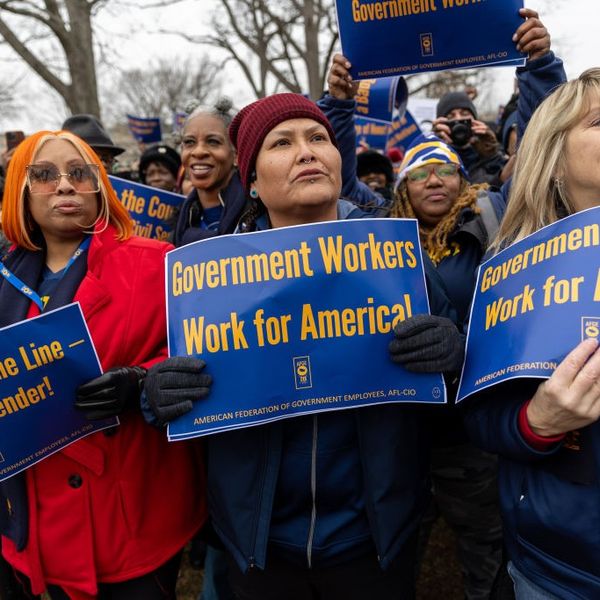
When elected officials in the United States abuse their power or take actions that unnecessarily harm the public, walkouts by public workers can function as an important constraint. (Photo: Scott Olson/Getty Images)
Public Workers' Trump Card
Never underestimate the power of airport delays to arouse the nation
Air traffic controllers hold the trump card (pardon the expression) in upcoming negotiations between Donald Trump and congressional Democrats over border security.
That's because the president and the Republicans know that another shutdown would likely cause a repeat of what happened last Friday, when so many of the nation's air traffic controllers called in sick that America's air traffic came to a near standstill. Hours later, Trump agreed to reopen the government without funding for his wall.
Never underestimate the power of airport delays to arouse the nation. Nancy Pelosi deserves credit for sticking to her guns, but the controllers brought the country to its knees.
Trump is threatening another shutdown if he doesn't get his way by 15 February, when government funding will run out again. "Does anybody really think I won't build the WALL?" he tweeted Sunday, after his acting chief of staff said that he was prepared to shutter the government for a second time.
But his threat is for the cameras. If there's no agreement this time around, the controllers won't work another 35 days without pay. Now that they understand their power, they will shut down the shutdown right away. Trump knows this.
Ironically, it was Ronald Reagan's audacious decision in 1981 to fire and replace more than 11,000 air traffic controllers who were then striking illegally that legitimized decades of union busting. It signaled to employers around the country that unions--both public and private-sector--were fair game.
It also unleashed political forces against unions, culminating last year with the supreme court's 5-4 decision in Janus v AFSCME, holding that government workers can't be forced to contribute to labor unions that represent them in collective bargaining.
But the decision last week by thousands of controllers not to come to work wasn't a strike, and it wasn't initiated by a union. Beforehand, Paul Rinaldi, the president of the controller's union, the National Air Traffic Controllers Association, even went so far as to announce that the union did not "condone or endorse any federal employees participating in or endorsing a coordinated activity that negatively effects the capacity of the National Airspace System".
The larger story is that public workers who lack any formal power to strike - but have the informal power not to work - are becoming a new force in American politics and labor relations.
Controllers simply stayed home. No federal law prohibits federal employees from getting sick or calling in sick. And who's to say it was coordinated? Today, the internet can spread information about a voluntary walkout as quickly and efficiently as any centralized coordinator.
The larger story is that public workers who lack any formal power to strike - but have the informal power not to work - are becoming a new force in American politics and labor relations.
Look what teachers accomplished last year by walking out of their classrooms in the unlikeliest of places - West Virginia, Arizona, Oklahoma, Kentucky, Colorado and North Carolina. Most of these are Republican "right-to-work" states that bar strikes by public employees. In recent years, all have slashed school funding and eroded teacher pay and benefits.
Like the air traffic controllers, the teachers chose not to work rather than give in to what they considered intolerable conditions. These unauthorized "wildcat" strikes won gains in teachers' salaries and funding for schools. (Not incidentally, they also galvanized thousands of teachers to run for office in the 2018 midterm elections.)
They were especially powerful because they offered elected officials no union leader or chief organizer with whom to negotiate a deal, who would then sell it to rank-and-file workers. As with the air traffic controllers last week, officials had to back down because the people they were dealing with were all rank-and-file, and public pressure was mounting rapidly.
Not all public workers can expect similar results by walking off their jobs. The walkout has to cause a major and visible disruption. (A work stoppage by FDA inspectors would hardly be noticed, at least until the public begins to worry about toxic drugs and tainted meat.)
And the public has to be supportive. By the fifth week of Trump's shutdown, polls showed the public highly sympathetic to federal workers who hadn't been paid. Likewise, most Americans have been on the side of teachers. National polls have shown the public largely in favor of higher teacher pay and supportive of teachers' right to strike.
Finally, it's not a weapon that can be used often because it relies for its potency on public frustration and inconvenience. If walkouts by public employees in France and other nations are any guide, public patience eventually wears thin.
But when elected officials in the United States abuse their power or take actions that unnecessarily harm the public, walkouts by public workers can function as an important constraint.
In the age of Trump, we need all the constraints we can get.
An Urgent Message From Our Co-Founder
Dear Common Dreams reader, The U.S. is on a fast track to authoritarianism like nothing I've ever seen. Meanwhile, corporate news outlets are utterly capitulating to Trump, twisting their coverage to avoid drawing his ire while lining up to stuff cash in his pockets. That's why I believe that Common Dreams is doing the best and most consequential reporting that we've ever done. Our small but mighty team is a progressive reporting powerhouse, covering the news every day that the corporate media never will. Our mission has always been simple: To inform. To inspire. And to ignite change for the common good. Now here's the key piece that I want all our readers to understand: None of this would be possible without your financial support. That's not just some fundraising cliche. It's the absolute and literal truth. We don't accept corporate advertising and never will. We don't have a paywall because we don't think people should be blocked from critical news based on their ability to pay. Everything we do is funded by the donations of readers like you. Will you donate now to help power the nonprofit, independent reporting of Common Dreams? Thank you for being a vital member of our community. Together, we can keep independent journalism alive when it’s needed most. - Craig Brown, Co-founder |
Air traffic controllers hold the trump card (pardon the expression) in upcoming negotiations between Donald Trump and congressional Democrats over border security.
That's because the president and the Republicans know that another shutdown would likely cause a repeat of what happened last Friday, when so many of the nation's air traffic controllers called in sick that America's air traffic came to a near standstill. Hours later, Trump agreed to reopen the government without funding for his wall.
Never underestimate the power of airport delays to arouse the nation. Nancy Pelosi deserves credit for sticking to her guns, but the controllers brought the country to its knees.
Trump is threatening another shutdown if he doesn't get his way by 15 February, when government funding will run out again. "Does anybody really think I won't build the WALL?" he tweeted Sunday, after his acting chief of staff said that he was prepared to shutter the government for a second time.
But his threat is for the cameras. If there's no agreement this time around, the controllers won't work another 35 days without pay. Now that they understand their power, they will shut down the shutdown right away. Trump knows this.
Ironically, it was Ronald Reagan's audacious decision in 1981 to fire and replace more than 11,000 air traffic controllers who were then striking illegally that legitimized decades of union busting. It signaled to employers around the country that unions--both public and private-sector--were fair game.
It also unleashed political forces against unions, culminating last year with the supreme court's 5-4 decision in Janus v AFSCME, holding that government workers can't be forced to contribute to labor unions that represent them in collective bargaining.
But the decision last week by thousands of controllers not to come to work wasn't a strike, and it wasn't initiated by a union. Beforehand, Paul Rinaldi, the president of the controller's union, the National Air Traffic Controllers Association, even went so far as to announce that the union did not "condone or endorse any federal employees participating in or endorsing a coordinated activity that negatively effects the capacity of the National Airspace System".
The larger story is that public workers who lack any formal power to strike - but have the informal power not to work - are becoming a new force in American politics and labor relations.
Controllers simply stayed home. No federal law prohibits federal employees from getting sick or calling in sick. And who's to say it was coordinated? Today, the internet can spread information about a voluntary walkout as quickly and efficiently as any centralized coordinator.
The larger story is that public workers who lack any formal power to strike - but have the informal power not to work - are becoming a new force in American politics and labor relations.
Look what teachers accomplished last year by walking out of their classrooms in the unlikeliest of places - West Virginia, Arizona, Oklahoma, Kentucky, Colorado and North Carolina. Most of these are Republican "right-to-work" states that bar strikes by public employees. In recent years, all have slashed school funding and eroded teacher pay and benefits.
Like the air traffic controllers, the teachers chose not to work rather than give in to what they considered intolerable conditions. These unauthorized "wildcat" strikes won gains in teachers' salaries and funding for schools. (Not incidentally, they also galvanized thousands of teachers to run for office in the 2018 midterm elections.)
They were especially powerful because they offered elected officials no union leader or chief organizer with whom to negotiate a deal, who would then sell it to rank-and-file workers. As with the air traffic controllers last week, officials had to back down because the people they were dealing with were all rank-and-file, and public pressure was mounting rapidly.
Not all public workers can expect similar results by walking off their jobs. The walkout has to cause a major and visible disruption. (A work stoppage by FDA inspectors would hardly be noticed, at least until the public begins to worry about toxic drugs and tainted meat.)
And the public has to be supportive. By the fifth week of Trump's shutdown, polls showed the public highly sympathetic to federal workers who hadn't been paid. Likewise, most Americans have been on the side of teachers. National polls have shown the public largely in favor of higher teacher pay and supportive of teachers' right to strike.
Finally, it's not a weapon that can be used often because it relies for its potency on public frustration and inconvenience. If walkouts by public employees in France and other nations are any guide, public patience eventually wears thin.
But when elected officials in the United States abuse their power or take actions that unnecessarily harm the public, walkouts by public workers can function as an important constraint.
In the age of Trump, we need all the constraints we can get.
Air traffic controllers hold the trump card (pardon the expression) in upcoming negotiations between Donald Trump and congressional Democrats over border security.
That's because the president and the Republicans know that another shutdown would likely cause a repeat of what happened last Friday, when so many of the nation's air traffic controllers called in sick that America's air traffic came to a near standstill. Hours later, Trump agreed to reopen the government without funding for his wall.
Never underestimate the power of airport delays to arouse the nation. Nancy Pelosi deserves credit for sticking to her guns, but the controllers brought the country to its knees.
Trump is threatening another shutdown if he doesn't get his way by 15 February, when government funding will run out again. "Does anybody really think I won't build the WALL?" he tweeted Sunday, after his acting chief of staff said that he was prepared to shutter the government for a second time.
But his threat is for the cameras. If there's no agreement this time around, the controllers won't work another 35 days without pay. Now that they understand their power, they will shut down the shutdown right away. Trump knows this.
Ironically, it was Ronald Reagan's audacious decision in 1981 to fire and replace more than 11,000 air traffic controllers who were then striking illegally that legitimized decades of union busting. It signaled to employers around the country that unions--both public and private-sector--were fair game.
It also unleashed political forces against unions, culminating last year with the supreme court's 5-4 decision in Janus v AFSCME, holding that government workers can't be forced to contribute to labor unions that represent them in collective bargaining.
But the decision last week by thousands of controllers not to come to work wasn't a strike, and it wasn't initiated by a union. Beforehand, Paul Rinaldi, the president of the controller's union, the National Air Traffic Controllers Association, even went so far as to announce that the union did not "condone or endorse any federal employees participating in or endorsing a coordinated activity that negatively effects the capacity of the National Airspace System".
The larger story is that public workers who lack any formal power to strike - but have the informal power not to work - are becoming a new force in American politics and labor relations.
Controllers simply stayed home. No federal law prohibits federal employees from getting sick or calling in sick. And who's to say it was coordinated? Today, the internet can spread information about a voluntary walkout as quickly and efficiently as any centralized coordinator.
The larger story is that public workers who lack any formal power to strike - but have the informal power not to work - are becoming a new force in American politics and labor relations.
Look what teachers accomplished last year by walking out of their classrooms in the unlikeliest of places - West Virginia, Arizona, Oklahoma, Kentucky, Colorado and North Carolina. Most of these are Republican "right-to-work" states that bar strikes by public employees. In recent years, all have slashed school funding and eroded teacher pay and benefits.
Like the air traffic controllers, the teachers chose not to work rather than give in to what they considered intolerable conditions. These unauthorized "wildcat" strikes won gains in teachers' salaries and funding for schools. (Not incidentally, they also galvanized thousands of teachers to run for office in the 2018 midterm elections.)
They were especially powerful because they offered elected officials no union leader or chief organizer with whom to negotiate a deal, who would then sell it to rank-and-file workers. As with the air traffic controllers last week, officials had to back down because the people they were dealing with were all rank-and-file, and public pressure was mounting rapidly.
Not all public workers can expect similar results by walking off their jobs. The walkout has to cause a major and visible disruption. (A work stoppage by FDA inspectors would hardly be noticed, at least until the public begins to worry about toxic drugs and tainted meat.)
And the public has to be supportive. By the fifth week of Trump's shutdown, polls showed the public highly sympathetic to federal workers who hadn't been paid. Likewise, most Americans have been on the side of teachers. National polls have shown the public largely in favor of higher teacher pay and supportive of teachers' right to strike.
Finally, it's not a weapon that can be used often because it relies for its potency on public frustration and inconvenience. If walkouts by public employees in France and other nations are any guide, public patience eventually wears thin.
But when elected officials in the United States abuse their power or take actions that unnecessarily harm the public, walkouts by public workers can function as an important constraint.
In the age of Trump, we need all the constraints we can get.

